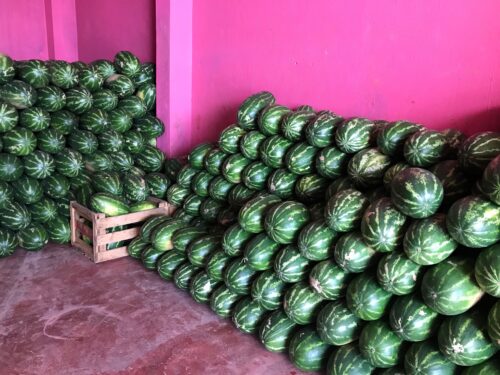
Mercado Municipal José Castillo Tielemans, San Cristóbal de las Casas, Chiapas – Photo © Claudia Itzkowich Schñadower
“Just Food,” the theme of our current issue, slyly downplays the power of food by dishing it up as utterly ordinary. The very idea of “just food” may, in fact, be an oxymoron. The humbleness implied by “just” in no way conveys the potency of the political, historical and social forces that converge in the essays we are about to share. Nor does it explain our deep and tender sense of connection or the emotional and aesthetic responses evoked by the simplest of dishes or produce – as the literary and visual pieces in this issue will attest.
For starters, Subhadra Khaperde and Rahul Banerjee, who have devoted most of their lives to fighting for organic farming and the rights of the farmers, present a clear and incisive history of food from the Neolithic Revolution to the current globalized system of chemical agribusiness. Such a feat of historical research, analysis and synthesis is reminiscent of Sidney W. Mintz’ groundbreaking anthropological study of the 1980s, Sweetness and Power, which looks at transatlantic slavery by following the evolution of sugar from an extravagant luxury item to a staple of the industrial working class. More than three decades later, Khaperde and Banerjee trace the effects of colonialism and industrialization on the cultivation of food, and the damage wreaked by multinational corporations, market and war-driven economics and the extreme logic of capitalist practices. What’s more, they offer the seeds – literally and figuratively – of grassroots solutions to bring the planet, and humanity, back from the brink.
Covering similar ground but in “bite-sized” bits, Rana Bose’s opinion piece, “Some Hard-to-Chew Facts,” gets to the core issues of famine, the role of war and political instability on food security, cash crops vs crops for sustainability, monoculture, multiculture and desertification, biodiversity, peasants and farmers, and more. At the request of the editorial team, Bose transformed his original catalyzing rant into this “mixtape” factsheet, debunking myths and cultivating fresh perspectives.
In her review of Wendell Berry’s epic poem The Farm (first printed in 1995), Louise Carson shares her down-to-earth reflections on the viability of engaging in urban or rural food growing, and on Berry’s poetic insights inspired by land and tree and “good work.” Verses like the one where Berry comments on the harvest of those engaged in small-scale organic farming give pause for thought:
‘Too much for us,’ you’ll say,
And give some more away –
Or try to; nowadays,
A lot of people would
Rather work hard to buy
Their food already cooked
Than get it free by work.”
Without romanticizing or preaching, Carson’s review mirrors Berry’s gentle poetry and engages us in deeply personal explorations.
The (im)morality of how we treat food and the land is evident at every turn – but so too is the vivid emotional connection we have with our food. And very often, that immorality and sense of connection are intertwined.
A case in point is bannock, the flatbread that is a well-loved staple in many Indigenous households. Ossie Michelin, director of the award-winning podcast series Telling Our Twisted Histories, explains in an interview with Serai editor Kerry McElroy that this simple word – the subject of one of the series’ 11 episodes – elicits a whole range of associations: for some, memories of colonialism, hunger and abuse by the Hudson Bay’s Company; and for others, the comforting warmth of a traditional family gathering. The podcast is designed to bring people together “to decolonize our minds: one word, one concept, one story at a time.”
Two poets featured in the issue, Nicola Vulpe and Nilambri Ghai, evoke the depths of emotional universes with “POEM OF THE UNFINISHED SANDWICH” and “POEM OF ANCESTORS” (Vulpe), and “Green String Beans” (Ghai). Their poems are illustrated with powerful art by Leonor Vulpe Albari and Amani Singh, respectively.
Meanwhile, Joseph Kary’s poignant photographic essay, “The Hands Remember,” needs no words to make us feel, dream, smell… or cry, even.
This issue wouldn’t be worth its salt without the imminent presence of a bustling, overflowing market. “A Ritual of Humble Abundance” spontaneously materialized in answer to our call. Laurel Páez Brave, a new contributor to Serai, shares an amusing, delectable story about a ritual foray into San Salvador’s Central Market, where the teeming abundance of all things edible is shadowed by poverty and undercurrents of gang violence.
And while the preliminary behind-the-scene work for this issue triggered Rana Bose’s concerned and biting mixtape, it also ushered in a flurry of transcultural expressions associating food and love, as you’ll see in the first part of Maya Khankhoje’s essay “El tamalito.” This playful text doubles as a review of a trilingual children’s book (Nahuatl-Spanish-English) that likens tamales wrapped in corn leaves to tenderly snuggled babies. In the process, its author and publisher, Isela Xospa, conveys a powerful message about the preciousness of local foods… and languages, and publishing efforts. The book’s simple and endearing illustrations make the political and the ethical delightfully digestible.
This is the first time we’ve devoted a whole issue to food, but we are so pleased with the response to such a fundamental topic to sink our teeth into that chances are it will not be the last. Our special thanks to Samantha-Lee Quinn (“Sam”) for her ongoing input, support and accompaniment throughout this issue.
Bon appétit!








